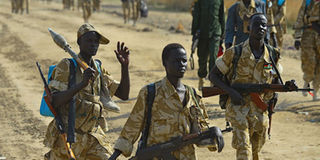Government forces retake Machar’s hometown, say South Sudan rebels

PHOTO | CARL DE SOUZA Sudan People’s Liberation Army government soldiers walk along a road in Mathiang near Bor at the weekend.
What you need to know:
- A ceasefire has theoretically been in place for almost 10 days
- Government soldiers and allied militia “advanced on Leer town on February 1, 2014 destroying everything on their path. (President Salva) Kiir’s forces burned down the whole of Leer town and the entire surrounding villages,” a statement from rebel spokesman Lul Ruai Koang said.
JUBA
South Sudan government forces have recaptured Leer, the hometown of nominal rebel leader Riek Machar in the northern oil-producing state of Unity, a spokesman for the rebels said on Sunday.
Government soldiers and allied militia “advanced on Leer town on February 1, 2014 destroying everything on their path. (President Salva) Kiir’s forces burned down the whole of Leer town and the entire surrounding villages,” a statement from rebel spokesman Lul Ruai Koang said.
There was no independent confirmation that Leer had changed hands. But medical charity Doctors without Borders (MSF, Medecins sans Frontieres) reported on Friday that a team of its local health workers had taken “several dozen of the most seriously ill patients from Leer hospital with them into the bush, fearing for their safety”.
“Other patients who were well enough to leave of their own accord also fled, and there are no longer any patients or staff left at Leer hospital,” MSF said. Mr Koang accused the government troops of having hunted down and killed women and children and elderly people who had gone to hide in nearby bushes and swampy areas.
“The latest destruction of Leer town...has no strategic, operational or tactical importance,” the spokesman said, accusing Kiir of having merely derived “satisfaction” from destroying Machar’s home town.
Since the South Sudan conflict started in mid-December both sides have traded accusations of abuses, with the United Nations and rights groups reporting that both sides have committed atrocities.
Thousands have been killed in the conflict and over 700,000 people have fled their homes in seven weeks of violence.
A ceasefire has theoretically been in place for almost 10 days but multiple violations have been reported.
Meanwhile, all that remains of Bor, a small market town that has changed hands four times in the latest South Sudan conflict, is an overwhelming smell of putrefying bodies and scattered trash that successive waves of looters ignored. Warped sheets of rusting corrugated iron roofing, apparently the remains of market stalls, lie in tangled heaps.
Scattered across the street are the objects the looters did not want — ragged bits of clothing, cardboard boxes, single plastic slippers.
The ruins of the town, in which hundreds of civilians were killed, in some cases shot in the back as they fled, are eerily silent.
“My son was killed when the enemies came attacking people. My brother ran with his family and my son was also trying to run but as he was running to hide he was shot in the back,” recounted Majuer Garang, a tall, stoic man, under a tree on the outskirts of Bor where the dead remain where they fell, on narrow paths, or curled up under beds in their homes.
Towards the town centre a barefoot woman scurries across the main street, a table on her head.
Residents have started trickling slowly back into town for a few hours just to see if they can salvage any belongings the looters left behind. Some of the bodies have been piled into shallow graves.
Others still litter the streets, the white plastic sheeting — now covered with a thick layer of yellow dust — that covers some of them shields them from view but fails to disguise the fetid smell after days or weeks in the baking heat. Pedestrians hurrying past hold their breath.




